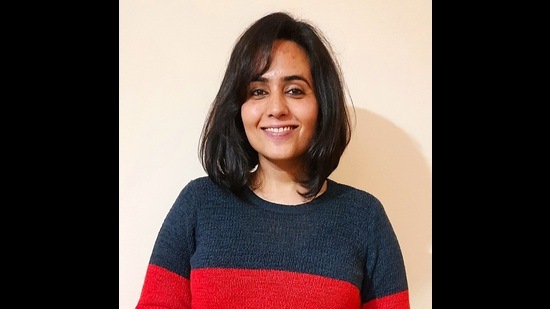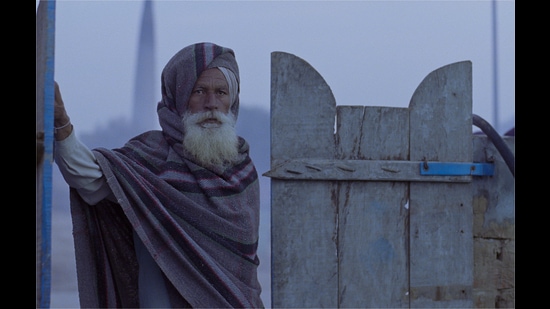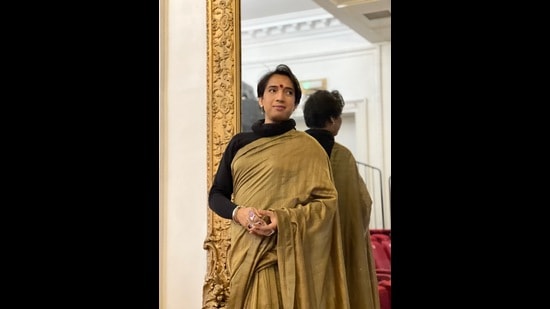They inhabit a liminal space on Indian screens, there but not really there. The trans person is typically portrayed as a hijra in the mainstream, strong but kind, often a friend or ally of troubled women, sometimes cunning, sometimes evil, always on the margins.
The trope of the hijra is, of course, a very limited prism through which to view trans identities and experiences. But what’s worse than the limited prism, in many ways, is that when you see a trans person on screen, there is rarely a trans actor involved.
Today, as streaming platforms alter the worlds of storytelling, catalysing a change in audiences too, new views of transness are emerging. There was the beautiful and tragic Kukoo in Season 1 of Sacred Games (2018-19). The powerful and menacing Razia Bai in Gangubai Kathiawadi (2022). The transwoman in a relationship with Ayushmann Khurrana’s Manu in Chandigarh Kare Aashiqui (2021). The story follows their lives as she comes out to him, and his tumultuous journey towards acceptance.
These stories of transness were sensitive, evocative, triumphant. But all three roles were played by cis-het actors (Kubbra Sait; Vijay Raaz; Vaani Kapoor). Still not a trans person in sight.
Trans talent may need some handholding, says Sridhar Rangayan, director of the Kashish Mumbai International Queer Film Festival, and they may not have the star status yet. “But stars can be created. Directors do it all the time. It’s a matter of investing in someone, training and workshopping with them.”
Meenakshi Shedde, film curator and South Asia delegate to the Berlin film festival, points out that in cinema, a start is often made with “behalf-ist films”, which can then pave the way for marginalised communities to speak for themselves.
“One of the finest films made on Dalit issues is Shyam Benegal’s Samar (1999). Shyam Babu is an upper-caste person who is empathetic and a very fine filmmaker. But that filmmaking has a very different power from the films of Nagraj Manjule (Sairat, Jhund, Fandry), who comes from the community and draws from his own and the community’s experiences, which have a very raw power and immediacy. Both kinds of films are extremely valuable, and there’s a different kind of power when people tell their own stories.”
For now, change is trickling into the mainstream, with trans people appearing in front of and behind the camera, in roles as varied as screenwriting, cinematography, direction and acting.
Satya Rai Nagpaul, cinematographer of the critically acclaimed Anhey Ghohrey Da Daan(2011) and Hansal Mehta’s Aligarh (2015), is a trans masculine person. Gazal Dhaliwal, who wrote the dialogue for Alankrita Shrivastava’s Lipstick Under My Burkha (2016), is a transwoman. Pradipta Ray, who won best emerging filmmaker at the Kashish festival for Raat Baaki (2012), is a transwoman. Mairembam Ronaldo Singh from Manipur and Anjali Ameer from Kerala are trans women who have played both trans and cis-het characters on screen. Anjali has acted alongside Malayalam superstar Mammootty. Singh had a significant role in Season 1 of Paatal Lok (2020-).
It’s a far cry from where things were two decades ago, when Bobby Darling became the first openly queer character in the mainstream. Most of the scripts she gets still want her to play a gay man, she says.
Is part of the answer to exclusively cast trans actors in trans roles? That is a rather limited solution, members of the community say. “We are talking about a niche area of work and opportunity, which cannot be translated into a viable career option. But if you’re saying a trans person can play any role, just like in Chandigarh Kare Ashiqui a cis-woman plays the role of a transwoman, now that is something I’d like to see,” director Ray says.
In Hollywood, admittedly flawed in numerous ways, some steps are being taken in this direction. Laverne Cox plays an Ivy League lawyer at a boutique law firm in the 2017 show Doubt; her trans identity is not crucial to the plot. Season 2 of the Mindy Kaling production Never Have I Ever (2020-) featured a school counsellor played by transwoman Alexandra Billings. Her transness was neither part of the plot not explicitly commented upon.
In India, “regional, independent films have been exploring these themes more sensitively than the mainstream,” says Shedde. “The late Rituparno Ghosh was crucial in this respect. The actor Sanchari Vijay won a National Award for portraying trans activist Living Smile Vidya in the 2015 Kannada film Naanu Avanalla… Avalu (I’m Her… Not Him).”
Last year, Benjamin Daimary became the first openly gay Indian actor to win a National Award, for his role in the Assamese film Jonaki Porua (2019; Fireflies), about a young transwoman who faces hate and ignorance while on a journey of self-discovery. The Kerala state government has opened up all film awards to trans artists too. Tamil Nadu-born Negha S became the first transwoman to win best debut actor, for her Malayalam film Antharam, about the journey of a transwoman from the streets to life as a homemaker.
There is still a long way to go, and not just on trans representation, says actor Anjali. “If you think about it, Dalits and tribals have been marginalised most in the industry,” she adds. “Even women are still fighting to be represented, and we are such a majority.”
.
Streaming into view: Mairembam Ronaldo Singh, actor

Focus on authenticity and talent: That was the brief from the makers of the Amazon web series Paatal Lok (2020-). And so it was that Casting Bay went looking for a trans person from the north-east, to cast in the role of a trans person from the north-east.
Mairembam Ronaldo Singh was still in college. The auditions were being held in Imphal, in December 2018, during her final exams. She lived an hour outside the city. Would their paths even cross?
As luck would have it, the casting agents couldn’t find what they were looking for. “Basically once we got there, we had to convince everyone that we were genuine,” says Nikita Grover of Casting Bay. “It was great to see so many trans people in Imphal, running salons, getting on with their lives. The challenge was getting those auditioning to learn the lines, because Hindi is unfamiliar to many Manipuri natives.”
At the end of a 10-day search, Casting Bay was getting ready to leave when Grover got a call about a transwoman in Moirang who was interested in the part. So, at the last minute, they travelled to her.
Mairembam, then 19, was nervous. She didn’t speak Hindi. She’d never faced the camera before. But she had worked as an actor and make-up artist for the theatre group of Nupi Manbi (literally, Look Like A Girl), a transgender community in Manipur. “I knew that if there was one thing that would get me through the audition, it was my acting prowess,” says Mairembam, 23. So she learnt the lines by rote, and tried out. When she heard that she had landed the role, “I couldn’t sleep,” she says.
Her moving performance is hard to miss in Season 1 of Amazon Prime’s Paatal Lok. Her character, Mary Lyngdoh aka Cheeni, is arrested along with three men, in a case of conspiracy to commit murder. She is thrown in a jail cell with male inmates. She is trapped in a system that won’t see her for who she is.
“Getting this opportunity to play a character that represented an entire community and the struggles they face was huge for me,” says Mairembam. “I was happy that the role also depicts how my people are treated and the sorts of things they have to go through when they get caught in the system.”

Her parents were concerned that in Mumbai, on the sets, she would find herself in a version of the world she was set to portray. “I had to convince them to let me to go to Mumbai for 20 days,” says Mairembam, who is now a make-up artist based in Chandigarh. “They are glad they did.”
Next, she’d like to play “just another character”. A role not necessarily rooted in her trans identity. A role where “I am the same as everyone else, and am holding down a job just like everyone else. The dream is for equality to be portrayed on screen,” she says.
.
Flipping the script: Gazal Dhaliwal, screenwriter

Perhaps part of the reason Gazal Dhaliwal is so successful as a screenwriter is that she knows the difference that stories can make. Growing up gender-dysphoric in a film-loving Punjabi family in Patiala, Dhaliwal found refuge in imagined worlds. “It was the only way for me to have an out-of-body experience, from a body that I didn’t fit into,” she says.
Dhaliwal would go onto study chemical engineering and get a job with Infosys. But two years later, in 2005, she quit and signed up for a filmmaking course at the Xavier Institute of Communications in Mumbai. There, in quick succession, she transitioned from Gunraj to Gazal, and started to write.
She has since been credited on projects such as Lipstick Under My Burkha (2016), Qarib Qarib Singlle (2017), Ek Ladki Ko Dekha Toh Aisa Laga (2019) and the Netflix young-adult web series Mismatched (2020-).
One of her earliest works, a documentary on transgender people and sex reassignment made as part of her course work, helped her and her family comes to terms with her transness. Writing the dialogue for Alankrita Shrivastava’s Lipstick… was her big break. Her trans identity, she says, has not really come in the way of her cinematic pursuits. “I haven’t come across really obvious discrimination,” says Dhaliwal, 40. “As a trans person, you’re sensitive to the stares. There’s some curiosity, inquisitiveness, sometimes judgment, and sometimes a look of, ‘What the hell is that?’”
It’s lonely behind the scenes, she admits, being one of the few trans people who’ve made it. It’s also hard to shake the “trans-writer” tag. She’d prefer to just be known as a screenwriter. But, in an indication of the times, Dhaliwal wrote a tale of transness that was turned into a short film starring Konkona Sen Sharma, in 2019. A Monsoon Date is about a transwoman about to come out to the cis man she is dating. “We made it when visibility and conversation about transwomen was even lower. Having Konkona allowed us to get the budget to get the film made. If we hadn’t had that face, I don’t know…. And Konkona gave it her all. On set, it was like she was living the experiences. I was in tears watching her perform.”
What is Dhaliwal’s dream gig? “I’ve always held back from such a dream because it just seems totally unrealistic, but it would be very nice to direct a murder mystery where the protagonist is a transwoman detective,” she says, laughing. “A curious entangled murder mystery, on a really big budget, like Knives Out (2019), where the conversation is not about our problems or even about falling in love. A film where trans representation is the norm. Yes, the character will have a past that could play into the story, but the story doesn’t need to be about that past.”
.
A wider viewfinder: Satya Rai Nagpaul, cinematographer

It was a medical textbook that armed Satya Rai Nagpaul with the words he needed as a young trans masculine man. With doctors in the family, he spent years reading everything he could lay his hands on, he says, trying to make sense of how he felt about his gender.
He was 21 when he came across “transsexualism” in a diagnostic manual. “It seemed to be describing my experience,” says Nagpaul, now in his 40s. He talked to his family, who took his words seriously, even though it took his parents some time to get on board.
Meanwhile, after a degree in zoology, Nagpaul toyed with the idea of pursuing a life in academia. “But I realised that as a trans person, it would be really tough,” he says. Two things combined to show him another way forward: his father’s love for photography, and his own fascination with the male aesthetic.
“Cinematography has been a very male space,” says Nagpaul. “And the male aesthetic fascinated me. For me to inhabit cinematography was to inhabit a very male space. But it is equally important to emphasise that the embodiment of this aesthetic is no simple mirroring of the historical cis-male within cinematography; in fact it is almost counter to it. Cinematography is an extremely intersectional and collaborative space. You are of course dealing with the hardcore materiality of technology, but also, what you’re communicating through that technology are anthropocentric subjectivities and truth-seeking. That kind of storytelling became my aspiration.”
At 28, Nagpaul enrolled in the Film and Television Institute of India (FTII), Pune, and at 29, moved to Mumbai. The projects he has picked over the years have brought it all together for him, he says.
He shot onto the scene with his first feature-length film, Anhey Ghohrey Da Daan (2011; Punjabi for Alms for a Blind Horse), directed by Gurvinder Singh. The evocative, exquisitely shot tale of oppressed peasants and cruel landlords won Nagpaul a National Award for cinematography.

In 2013, he shot the Pakistani film Zinda Bhaag, starring Naseeruddin Shah. It’s a tale of three friends who dream of escaping their dead-end lives. It was the first Pakistani film to be nominated for an Oscar in over 50 years.
In 2015, he shot the acclaimed Chauthi Koot (The Fourth Direction), a film set in the violence-ridden Punjab of the 1980s; and the Manoj Bajpayee-starrer Aligarh, directed by Hansal Mehta, about a linguistics professor dealing with the aftermath of a sting operation that reveals that he is gay.
He has found his place in the world, but ask if he’s ever been discriminated against in Bollywood due to his gender identity and he says he’ll never know. “Discrimination in the industry is particularly difficult to evidence. There is no way of telling whether you’ve been kept out of a project for your gender. Like with any job that operates on a ‘gig’ format, this one too is a constantly shuffling space with many variables at play. Hopefully the work one puts out despite the never ending yo-yo will bring another cinematographic and collaborative challenge for one to thrive on.”
Nagpaul’s latest project premiered at Rotterdam this year. Crescent Night is the third in the Punjab trilogy with Gurvinder Singh.
.
Teacher, salesgirl, executive, wife: Anjali Ameer, actor

In her first film, Peranbu (2018; Tamil for Compassion), directed by the critically acclaimed Ram, Anjali Ameer acted alongside Malayalam superstar Mammootty. It’s the story of an exhausted man trying to raise an autistic child after his wife leaves. He finds his way with some help from Anjali’s character, Meera, a transwoman whom he eventually marries. Anjali landed the part after Mammootty saw a news report about her life as a transgender model.
In the films that have followed, the roles have been small, but Anjali has played a diverse range of characters, many of them cis-het. She’s been a teacher, a homemaker, a salesgirl, a corporate employee. She’s also modelled for a range of brands, from jewellery to textiles.
In a major upcoming release, Bernard, a psychological thriller directed by Devaprasad Narayanan, Anjali plays the wife of the titular character, a woman struggling to live with her husband’s paranoid delusions.
Anjali was 22 when she auditioned for the role of Meera, and she had already lived a lifetime. She lost her mother as an infant. When she came out to her conservative family in Class 10, they were aghast. She realised that if she stayed, she would never have the life she wanted. So, at 16, she left her home in Kozhikode, Kerala, travelling first to Chennai and then to Coimbatore in Tamil Nadu, where she was adopted by a hijra family. “It was very exciting. I was spending time with other trans people for the first time in my life,” Anjali says.
Anjali took up various jobs in Chennai, from begging to working at a call centre, a beauty parlour, and modelling. All the while, she saved up for gender affirmation surgery. “I had that desire, an unshakable wish. By the time I turned 19, it was done,” says Anjali, now 27.
In 2015, she was won two beauty pageants, Miss Coimbatore and Miss Splendid India, and made a brief appearance on Bigg Boss Malayalam (2018).
Life has been relatively easy for her, she says. “I have experienced discrimination and distasteful behaviour in the past, but not after my surgery. Perhaps it’s because of how I now look. Maybe people are more accepting because I don’t look like a transwoman, so they forget I’m a transwoman.”
Her dream is to star in a Sanjay Leela Bhansali film. “It’s also a dream to work with Ranveer Singh,” she says.
.
Twisting classic tropes: Pradipta Ray, filmmaker

When the economic downturn of 2008-09 hit and work dried up, Pradipta Ray was in a rut. She had moved to Mumbai about five years earlier, to make movies, and worked in an assortment of ancillary jobs. She had worked as an animator, and was known in the industry for the storyboards she made for Rang De Basanti (2006), Heyy Babyy (2007) and Kambakkht Ishq (2009).
“However flawed, the film industry tends to be more progressive than other industries,” says Ray. “On the face of it, people are generally concerned about your work and talent, not what you’re doing behind the scenes. You might find a technician giggling or a producer staring, but if you look at the history of the Bombay film industry, it’s been an industry that has always sheltered social outcasts.”
Animation came to Ray naturally; she has a Master’s from the National Institute of Design (NID), Ahmedabad. So did storytelling. Growing up in 1980s Calcutta, Ray recalls the influence that actor Helen and filmmaker Raj Kapoor had on her. “I was one of the biggest Helen fans. Mostly it was the glamour and glitter, and colours, and the flamboyance of those songs,” Ray says. “But Raj Kapoor films spoke to me. In a very organic process, I started loving his language of film. It questioned so many complex social problems and always had something to say.”
As the economy picked up and animation work streamed in, Ray revived her original dream, saved up, and set about making her first film, Raat Baaki (2012). It’s a tale of three couples, one straight and two queer, and their interconnected lives. It was screened at the Kashish Mumbai International Queer Film Festival, where Ray was named best emerging filmmaker of the year. That was a good year. She also got to pay tribute to Helen, when she showed up as a launda dancer in Anurag Kashyap’s Gangs of Wasseypur 2.
Ray’s most recent film, her fourth, is titled Muhafiz (The Protector) and was selected for the British Film Institute (BFI) Flare film festival, the biggest LGBTQ+ film festival in Europe, where it had its world premiere in March. Set during the 2002 Gujarat riots, it’s a story of courage against a backdrop of violence, involving a gay Hindu man and his Muslim friend, both in danger from rioters. The film had its India premiere at the Kashish festival this week, where it won two awards: Best Indian Narrative Short and Best Screenplay.
Ray is also visiting faculty at NID, a place she credits with her self-actualisation as a woman. On campus, with her students, she is comfortable. She finds that it’s her contemporaries who most resist acknowledging her as a woman, even contemporaries within the LGBTQ+ community. “If this is the case within the community, you can’t blame the rest of society. It’s how the human brain has been trained to function. And it’s hard to move out of that conditioning,” she says.
Her dream gig: A tribute to Raj Kapoor, in the form of a gay retelling of Prem Rog (1982). “It made such a huge statement in the ’80s. It questioned the caste system and the entire patriarchal and problematic feudal system, encouraged widow remarriage. It already is a story of forbidden love, with all the conflicts and crisis caused by traditions. It could be easily turned into a love story between a man and a trans woman.”
Enjoy unlimited digital access with HT Premium
Subscribe Now to continue reading

Stay connected with us on social media platform for instant update click here to join our Twitter, & Facebook
We are now on Telegram. Click here to join our channel (@TechiUpdate) and stay updated with the latest Technology headlines.
For all the latest Art-Culture News Click Here
